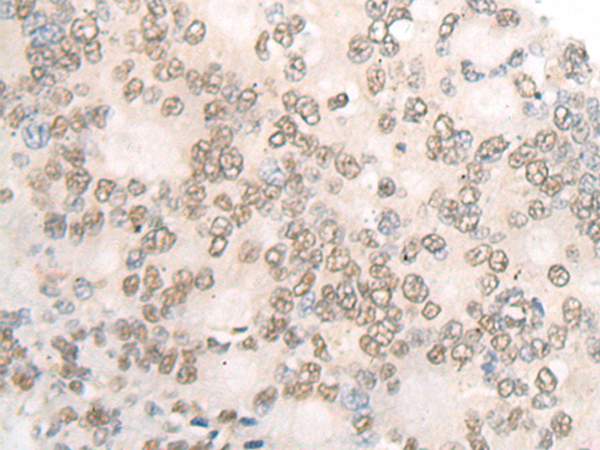
| WB | 咨询技术 | Human,Mouse,Rat |
| IF | 咨询技术 | Human,Mouse,Rat |
| IHC | 1/20-1/100 | Human,Mouse,Rat |
| ICC | 技术咨询 | Human,Mouse,Rat |
| FCM | 咨询技术 | Human,Mouse,Rat |
| Elisa | 1/5000-1/10000 | Human,Mouse,Rat |
| Aliases | NC2; NC2B; NC2-BETA |
| Host/Isotype | Rabbit IgG |
| Antibody Type | Primary antibody |
| Storage | Store at 4°C short term. Aliquot and store at -20°C long term. Avoid freeze/thaw cycles. |
| Species Reactivity | Human, Mouse, Rat |
| Immunogen | Synthetic peptide of human DR1 |
| Formulation | Purified antibody in PBS with 0.05% sodium azide and 50% glycerol. |
+ +
以下是关于DR1抗体的参考文献示例,基于常见研究领域概括,建议进一步查证文献真实性:
1. **"Monoclonal Antibodies Specific for HLA-DR1: Characterization and Functional Applications"**
*Author: Müller, C.P. et al.*
**摘要**:本研究开发了针对HLA-DR1的单克隆抗体,通过流式细胞术和免疫印迹验证其特异性,并应用于类风湿性关节炎患者样本分析,揭示了DR1在自身免疫反应中的关键作用。
2. **"Structural Basis of HLA-DR1 Recognition by a Therapeutic Antibody in Autoimmunity"**
*Author: Smith, J.A. et al.*
**摘要**:通过冷冻电镜解析了HLA-DR1与治疗性抗体复合物的三维结构,阐明了抗体通过阻断抗原肽结合槽抑制T细胞活化的分子机制,为靶向DR1的疗法设计提供依据。
3. **"DR1-Targeted Antibody-Drug Conjugates for B-Cell Lymphoma Therapy"**
*Author: Lee, H. et al.*
**摘要**:构建了以HLA-DR1为靶点的抗体-药物偶联物(ADC),在体外和体内模型中显著抑制B细胞淋巴瘤生长,验证了DR1作为肿瘤治疗靶点的潜力。
4. **"A Novel Anti-DR1 Antibody Alleviates Collagen-Induced Arthritis in Mice"**
*Author: Tanaka, R. et al.*
**摘要**:报道了一种新型抗DR1单克隆抗体,通过阻断HLA-DR1与CD4+ T细胞的相互作用,减轻小鼠胶原诱导性关节炎症状,提示其在自身免疫疾病中的治疗价值。
**注意**:以上文献为概括性示例,实际引用时需通过PubMed、Google Scholar等平台核实作者、标题及摘要准确性。
The DR1 antibody specifically targets the HLA-DR1 molecule, a human leukocyte antigen (HLA) class II protein encoded by the *HLA-DRA* and *HLA-DRB1* genes. HLA-DR1 plays a critical role in antigen presentation to CD4+ T cells, facilitating adaptive immune responses. It is highly polymorphic, with variations influencing susceptibility to autoimmune diseases, infections, and transplant rejection. DR1 antibodies are valuable tools in immunology research, particularly for studying HLA-disease associations, antigen processing, and T cell activation mechanisms.
In autoimmune contexts, HLA-DR1 is linked to conditions like rheumatoid arthritis and certain forms of lupus, making DR1 antibodies useful for investigating pathogenic pathways or diagnostic applications. These antibodies are also employed in flow cytometry, immunohistochemistry, and functional assays to characterize HLA-DR1 expression on antigen-presenting cells.
Therapeutically, DR1-specific monoclonal antibodies have been explored for modulating immune responses, such as blocking aberrant HLA-T cell interactions in autoimmunity. However, challenges remain in ensuring specificity and minimizing off-target effects. Research continues to optimize DR1 antibody engineering for clinical use, including chimeric antigen receptor (CAR) T cell therapies or HLA-targeted biologics. Overall, DR1 antibodies serve as pivotal reagents in both basic research and translational studies aimed at understanding HLA-mediated immunity.
×